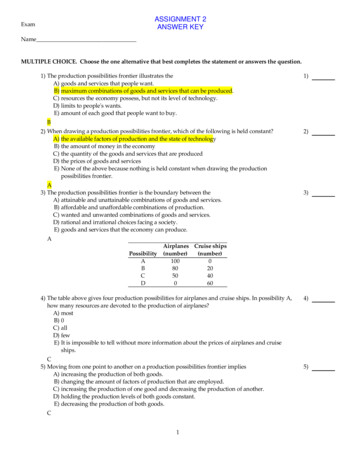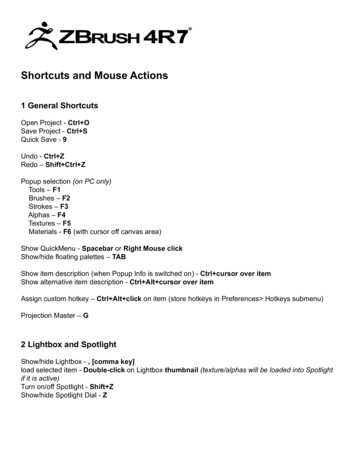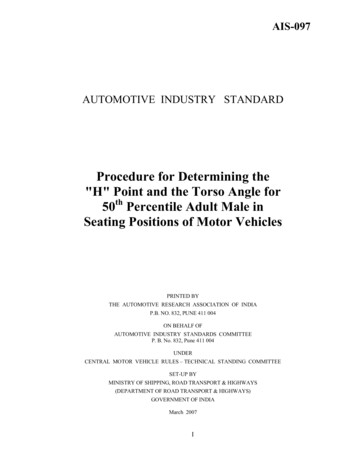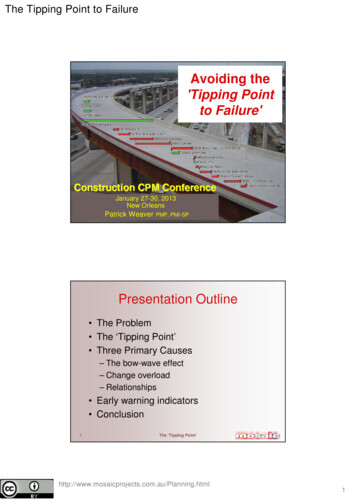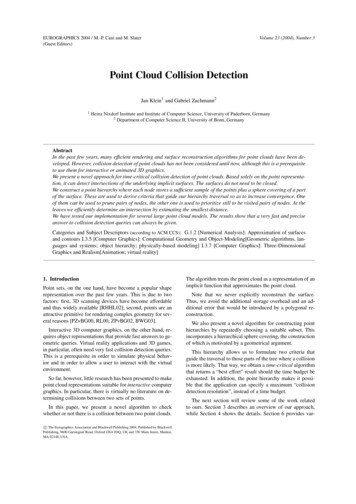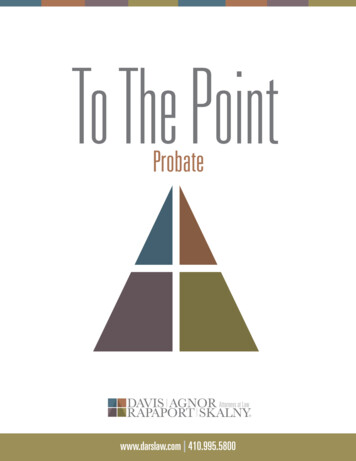
Transcription
To The PointProbatewww.darslaw.com 410.995.5800
IntroductionDuring a time when families are dealing with the emotional trauma of losing a loved one,facing the prospect of winding up the worldly affairs of that loved one can be overwhelming.The purpose of this pamphlet is to outline, in “plain English,” the procedures that shouldbe followed when dealing with probate.It has been our experience that the nature and issues involved in each probate estate are asunique as each individual. Therefore, the understanding of the general concepts containedin this brochure is just the beginning.
Table of Contents Page #Probate Defined . . . . . . . . . . . . . . . . . . . . . . . . . . . . . . . . . . . . . . . . . . . . . . . . . . . . . 2The Probate Process . . . . . . . . . . . . . . . . . . . . . . . . . . . . . . . . . . . . . . . . . . . . . . . . . . 3Small Estates . . . . . . . . . . . . . . . . . . . . . . . . . . . . . . . . . . . . . . . . . . . . . . . . . . . . . . 6Modified Administration . . . . . . . . . . . . . . . . . . . . . . . . . . . . . . . . . . . . . . . . . . . . 7Maintaining Records . . . . . . . . . . . . . . . . . . . . . . . . . . . . . . . . . . . . . . . . . . . . . . . . 8Miscellaneous Probate Considerations . . . . . . . . . . . . . . . . . . . . . . . . . . . . . . . . . . . . 9Inheritance Taxes . . . . . . . . . . . . . . . . . . . . . . . . . . . . . . . . . . . . . . . . . . . . . . . . . 10Funeral Expenses . . . . . . . . . . . . . . . . . . . . . . . . . . . . . . . . . . . . . . . . . . . . . . . . . 10Out-of-State Property . . . . . . . . . . . . . . . . . . . . . . . . . . . . . . . . . . . . . . . . . . . . . . 11Out-of-State Personal Representative . . . . . . . . . . . . . . . . . . . . . . . . . . . . . . . . . . 11Will Contests . . . . . . . . . . . . . . . . . . . . . . . . . . . . . . . . . . . . . . . . . . . . . . . . . . . . . . 12Probate vs. Non-Probate Property . . . . . . . . . . . . . . . . . . . . . . . . . . . . . . . . . . . . . . 13Jointly-Owned Property . . . . . . . . . . . . . . . . . . . . . . . . . . . . . . . . . . . . . . . . . . . . 13Beneficial Interest Property . . . . . . . . . . . . . . . . . . . . . . . . . . . . . . . . . . . . . . . . . . 13Trust Property . . . . . . . . . . . . . . . . . . . . . . . . . . . . . . . . . . . . . . . . . . . . . . . . . . . . 14Life Estates . . . . . . . . . . . . . . . . . . . . . . . . . . . . . . . . . . . . . . . . . . . . . . . . . . . . . . 14Dying Without a Will . . . . . . . . . . . . . . . . . . . . . . . . . . . . . . . . . . . . . . . . . . . . . . . 14The Taxable Estate . . . . . . . . . . . . . . . . . . . . . . . . . . . . . . . . . . . . . . . . . . . . . . . . . . 15Maryland Inheritance Tax . . . . . . . . . . . . . . . . . . . . . . . . . . . . . . . . . . . . . . . . . . . 15Federal Estate Tax . . . . . . . . . . . . . . . . . . . . . . . . . . . . . . . . . . . . . . . . . . . . . . . . . 16Maryland Estate Tax . . . . . . . . . . . . . . . . . . . . . . . . . . . . . . . . . . . . . . . . . . . . . . . 17Individual Income Tax . . . . . . . . . . . . . . . . . . . . . . . . . . . . . . . . . . . . . . . . . . . . . 17Fiduciary (Estate) Income Tax . . . . . . . . . . . . . . . . . . . . . . . . . . . . . . . . . . . . . . . . 18Income Tax Exposure for Beneficiaries . . . . . . . . . . . . . . . . . . . . . . . . . . . . . . . . . 18Cost of Probate . . . . . . . . . . . . . . . . . . . . . . . . . . . . . . . . . . . . . . . . . . . . . . . . . . . . 19Conclusion . . . . . . . . . . . . . . . . . . . . . . . . . . . . . . . . . . . . . . . . . . . . . . . . . . . . . . . . 20About Our Firm . . . . . . . . . . . . . . . . . . . . . . . . . . . . . . . . . . . . . . . . . . . . . . . . . . . . 21“To The Point” Probate1
Probate DefinedSimply put, probate is the process by which the government ensures that the creditors of thedecedent are paid, and also authorizes the Personal Representative to do whatever is necessaryto transfer property from the decedent to the decedent’s beneficiaries in accordance withthe decedent’s Last Will and Testament or in accordance with applicable law. The Orphans’Court, in conjunction with the Register of Wills, in each county oversees this process.When a person (or “decedent”) dies, someone must take responsibility for winding up thedecedent’s worldly affairs. That person is the “Personal Representative.” This person is alsocommonly known as the “executor.” The total of all of the decedent’s property is called thedecedent’s “estate,” and this property must be identified and appraised. The debts of thedecedent (including taxes) are paid out of the estate, and distributions are then made to thedecedent’s beneficiaries. Probate provides an orderly, court-supervised process for achievingthese goals.Please note that even if there is no probate property, there is a legal requirement to file theoriginal of a Will and certified copy of the death certificate with the Register of Wills inthe decedent’s county of residence in a timely manner. In addition, an Information Reportmust be completed and filed with the Register of Wills to report the decedent’s non-probateproperty. The concept of “probate” and “nonprobate” property is discussed under theProbate vs. Non-Probate section of this pamphlet.2“To The Point”: Probate
The Probate ProcessThe probate process begins when an estateis opened with the Register of Wills inthe decedent’s county of residence. Thereare three main types of probate estatesin Maryland, a “regular estate,” a “smallestate,” and an estate under “modifiedadministration.” A small estate proceeding,which is discussed in more detail later in thispamphlet, is proper for probate estate valuedat 50,000 or less (or 100,000 or less if thesole beneficiary of the estate is the survivingspouse). A regular estate proceeding is properfor probate estates with assets exceedingthose thresholds. In limited situations, aregular estate may be administered through“modified administration,” a process that isfurther defined later in this brochure.To open a regular probate estate, a Petitionfor Probate, together with the original copyof the decedent’s Will (and any Codicils,which are amendments to the Will) andthe original death certificate are filed withthe appropriate Register of Wills. ThePetition for a regular probate estate includeswhat is called a “Schedule A,” which is arough estimate of the value of the estate.The Register of Wills then appoints theperson nominated in the decedent’s Willas the Personal Representative, and issues“Letters of Administration,” which authorizethe Personal Representative to act in thedecedent’s place in all matters. If a persondies without a Will, the Register of Wills willstill appoint a Personal Representative on apriority basis established by law.A bond must also be filed. A bond providesa guarantee that the Personal Representativewill perform his duties faithfully, inaccordance with the Will and the law. Ifthe Will states that the requirement of abond has been waived, a “nominal bond”often must still be filed; this is a guarantee“To The Point” Probate3
to the State that inheritance or estate taxeswill be paid when due, and provides someprotection to creditors. In all other cases,including estates where there is no Will,a bond in the amount established by theRegister of Wills will have to be filed bythe Personal Representative. Any expenserelated to procuring a bond is paid fromthe estate’s assets.In addition, a List of Interested Personsmust be filed that identifies all of the legalheirs of the estate, including their addresses,regardless of whether they were named inthe Will. Finally, a Notice to Creditors mustbe filed with the Petition for Probate. ThisNotice will be sent by the Register of Willsto a local newspaper to be run once a weekfor three consecutive weeks.Note that the cost of the nominal bond andfor advertising the Notice to Creditors willbe paid by the Personal Representative at the4“To The Point”: Probatetime the estate is opened. The actual costwill vary from county to county, sometimessubstantially.Within 90 days after the estate has beenopened, the Personal Representative isrequired to file an Inventory with theRegister of Wills. This is a detailed listing ofall of the probate property that was ownedsolely by the decedent at the time of thedecedent’s death. (Probate property will befurther described later.)Not only does all of the probate propertyhave to be identified, but the value of thatproperty will have to be stated. Usually thisis done by having the property appraised bya qualified appraiser, although there are sometypes of property that can be appraised bythe Personal Representative (e.g., publiclytraded stocks and bank accounts).Also within 90 days of opening the estate,the Personal Representative must file an
Information Report with the Register ofWills. The Information Report is used toreport the “date-of-death” value of nonprobate property that passes to beneficiarieswho are subject to the Maryland InheritanceTax. In addition, property of the decedentthat was transferred to a taxable beneficiarywithin two years before the date of deathand the value of that property must alsobe reported on the Information Report.Maryland law presumes that propertytransferred within two years of death is atransfer made in contemplation of death,and thus, the value of that transferredproperty must also be taxed.There is a common misperception thatwhile an estate is being probated, there canbe no distributions to the beneficiaries,even in cases of need. That is not the case,even though, in most cases, distributionsare kept to a minimum for administrationpurposes. A Personal Representative maynot make a distribution if by doing so,legitimate expenses and taxes cannot bepaid. In addition, a Personal Representativemust follow the provisions of the Will(or, if there is no Will, the distributionprovisions contained in the law) in makingany distributions. If there is any doubt aboutwhether a distribution should be made priorto the closing of the estate, the PersonalRepresentative may ask the Orphans’Court for the authority to make any suchdistribution.Once nine months have passed from thetime the estate is opened, an accountingmust be filed that shows all of the incomeand expenses of the estate, and any sales ofestate assets, from the date of death of thedecedent. In most cases, the estate can beclosed at this time, which means that 20days after the accounting is approved bythe Orphans’ Court, final distributions canbe made to the beneficiaries. Where theremay be outstanding matters that precludethe closing of the estate at the time thatthe first accounting is filed, the PersonalRepresentative continues to administer theestate until all those outstanding issues areresolved, providing periodic accountingsas required by law (i.e. every 6 months).Typically, however, it takes approximately9 to 12 months to take an estate completelythrough probate.“To The Point” Probate5
Small EstatesIf the probate estate is valued at 50,000or less (or 100,000 or less if the solebeneficiary of the estate is the survivingspouse), the much simpler “small estate”probate process may be used.The administration of a small estate, likea regular estate, is initiated by filing a(i) Petition for Probate, (ii) the originalWill (and Codicils, if any), (iii) a Listof Interested Persons, and (iv) a deathcertificate with the appropriate Registerof Wills.The Petition for a small probate estate alsoincludes a Schedule B. This is an inventoryof all assets titled in the decedent’s individualname with the date-of-death values for eachof those assets. In addition, documentationto support the date-of-death values reportedon Schedule B must be filed as part ofthe Petition, along with a list of all of thedecedent’s known creditors and copies of anyfuneral bills. Finally, the Information Reportmust also be filed within three months fromthe filing of the Petition for Probate.6“To The Point”: ProbateWith a small estate, the maximum probatefee is 150 (or 300 if the surviving spouseis the sole beneficiary of the estate), butmay be less, depending on the value of theprobate assets. In addition, the PersonalRepresentative is not entitled to receivecommissions and, depending on the sizeof the small estate, a bond and Notice toCreditors may not be required. However,there are some situations where a Notice toCreditors may have to be filed and a bondposted. If so, the estate cannot be closeduntil after the six-month notice period haselapsed.After all of the required information andforms are submitted to the Register of Wills,the Personal Representative is appointed andthe creditors are paid so that the estate canbe closed and distributions can be made tothe beneficiaries. With a small estate, thePersonal Representative is not required tosubmit an accounting of the estate assets tothe Register of Wills.
Modified AdministrationThe concept of “modified administration”was created to respond to concerns that theprobate process was just too complicatedwhen only spouses and children wereinvolved as beneficiaries. A streamlined setof procedures requiring less supervisions bythe Register of Wills was formulated to makethe probate process simpler in these limitedsituations.Modified administration can be electedin solvent probate estates where thebeneficiaries are limited to individualsor entities exempt from the MarylandInheritance Tax or trusts established forindividuals exempt from the MarylandInheritance Tax. In order to make thiselection, the Personal Representative mustfile an Election for Modified Administrationwithin three months after the regularprobate estate is opened, and all of thebeneficiaries must file a Consent to Electionfor Modified Administration.Under modified administration, the formalinventory and final accounting are notrequired unless requested by one of theinterested persons. If no request is made,the Personal Representative must file a FinalReport Under Modified Administration,which includes much of the sameinformation that is required to be includedon the inventory and accounting in a regularestate; however, income of the estate doesnot need to be reported. This Final Reportis typically due within 10 months from thedate the estate is opened. If additional timeis needed, the deadline can be extended upto 180 days total (in 90 day increments) ifa Consent for Extension of Time signed bythe Personal Representative and all interestedpersons is filed in advance of the filingdeadline.“To The Point” Probate7
With modified administration, alldistributions must be made within 12months of opening the estate and the estateshould be closed no later than 13 monthsafter opening, if no extensions are filed.Because only limited extensions are allowedfor filing the Final Report, and because ofthe potential for being required to converta modified administration to a regularestate administration, this form of probateadministration is reserved for very limitedsituations where there is little possibility ofa dispute among the beneficiaries and wherethere is little likelihood that administrationwill be delayed because of the inability to sellan asset of the estate, such as a homeor business.Maintaining RecordsThe successful completion of the probateprocess in a timely manner is contingentupon the Personal Representative keepingcomplete and accurate records during thisprocess. In order to ensure that everythingis properly reported to the Register of Willsor to the Internal Revenue Service, thefollowing suggestions should be followed:1. Establish an Estate Checking Account.After the death of the decedent, thePersonal Representative may receivechecks from the decedent’s employer,from investments that were owned by thedecedent, from tax refunds, and from ahost of other sources. These checks shouldbe deposited into a checking accountthat is opened in the name of the estate.Before any check is deposited, however,a photocopy of that check should bemade so that if there is ever a questionabout the deposit, it can be answeredeasily and quickly. Note that before anestate checking account can be opened,the Personal Representative must obtaina taxpayer identification number for theestate from the IRS by filing a form SS-4.The Personal Representative will also needLetters of Administration and a certifiedcopy of the death certificate.2. Keep All Receipts. Whenever a bill ispaid by the Personal Representative, acopy of that bill should be kept with theestate’s records. It should be noted on thecopy when the bill was paid and the checknumber from the estate checking account8“To The Point”: Probate
that was used to pay the bill. Sometimes,a family member will pay for certainestate expenses (i.e. funeral or memorialservice) before the estate is officiallyopened. Those expenses should bereimbursed by the estate once the PersonalRepresentative has control of the estateassets. If a person is reimbursed from theestate checking account for expenses paidon behalf of the estate, a detailed recordof that reimbursement should be made atthe time of the reimbursement, includingcopies of any bills paid by that person.4. Funeral Expenses. Because funeralexpenses are a priority item to be paid bythe estate, and because these expensesare often scrutinized by the Register ofWills, the receipts associated with thedecedent’s funeral should be maintainedin a separate file.3. Convert Accounts to Estate Accounts.The decedent’s bank accounts andinvestment accounts should be changedfrom the decedent’s name to the estate’sname. If the decedent maintainednumerous accounts, it is recommendedthat the Personal Representativeconsolidate these accounts.“To The Point” Probate9
4. M iscellaneous ProbateConsiderations Inheritance Taxes. The MarylandInheritance Tax is a 10% tax ondistributions received by certainindividuals upon the death of a Marylandresident. Assets passing to a spouse, child,stepchild, grandchild, step-grandchild,other descendant, spouse of a descendant,parent, grandparent or sibling are exemptfrom this tax; however, assets passing toanyone else would be subject to this taxand must be reported to the Register ofWills in the Information Report and/or the formal accounting. If the assetspassed directly to a non-exempt beneficiaryoutside of probate (i.e. as the beneficiary ofa retirement account or a revocable trust),the value of those assets must be reportedin the Information Report. If the assets willbe distributed to a non-exempt beneficiary10“To The Point”: Probateas part of the decedent’s probate estate, thevalue of those assets will be reported in theformal accounting due within 9 monthsfrom the date the estate is opened. Pleasenote that most Wills contain provisionsthat the estate will pay any Inheritance Taxthat may come due; however, in situationswhen a person dies without a Will or witha Will that does not contain that provision,the beneficiary will be liable for anysuch tax. Funeral Expenses. It is the PersonalRepresentative’s responsibility to pay forany funeral expenses from the assets of theestate. If the decedent’s Will specificallyauthorizes the Personal Representativeto pay funeral expenses without courtsupervision, and if the estate is solvent,no court order is required. Otherwise,such expenses will be limited to 15,000,without express prior authority fromthe Orphans’ Court. Likewise, expenses
related to a memorial service or other suchgathering can be paid from the estate if theWill authorizes such payment. Out-of-State Property. If the decedentowned real property in another state,that property will have to go through theprobate process in that state in what iscalled an “ancillary probate proceeding.”It is an ancillary probate proceedingbecause the primary probate of thedecedent’s estate is performed in the stateof the decedent’s domicile at the timeof death. Each state has its own probateprocess, so it may be necessary to retain anattorney in that state to handle the probateon behalf of the Personal Representative.The hassle involved in administeringmultiple estates is one reason that manypeople are using revocable living trusts tohold title to real property owned in otherstates, and therefore avoid the probateprocess entirely. Real property held in arevocable trust eliminates the need foran ancillary probate proceeding for thatproperty because property is distributed bythe trustee in accordance with the termsof the trust. Of course, applicable stateinheritance taxes still have to be paid. Out-of-State Personal Representative.If the person named to serve as thePersonal Representative of an estatein a decedent’s Will does not live inMaryland, they must appoint someonein Maryland as the resident agent toaccept service on behalf of the estate inorder to be appointed as the PersonalRepresentative. This is required so that theOrphans’ Court retains jurisdiction overthe Personal Representative. This is donewhen the estate is first opened by filingthe Appointment of Resident Agent form;typically, the attorney for the PersonalRepresentative serves as Resident Agent.Similarly, if a non-resident wishes to beappointed as the Personal Representativeof an intestate estate, a resident agent mustbe appointed.“To The Point” Probate11
5. Will ContestsWhat happens if a beneficiary believes thata Will was signed under duress or throughundue influence, or if the beneficiarybelieves that the signer of the Will was notcompetent when the Will was signed? Or,what happens when a disgruntled familymember wants to contest the terms of aWill? Or, what happens if a Will was notproperly executed or does not meet all ofthe formal legal requirements? The answeris that a beneficiary may initiate a caveatproceeding before the Orphans’ Court. Inthis proceeding, the Orphans’ Court is askedto determine the validity of a Will, or tointerpret the terms of the Will.Caveat proceedings are meant to protectthe rights of the decedent. For example,there was a case before Maryland’s Courtof Appeals involving an elderly gentlemanwho, in the last days of his life, executed12“To The Point”: Probatea Will naming a live-in helper as his solebeneficiary, totally excluding his family.The gentleman needed a helper because hewas partially blind and paralyzed, and wasunable to read, write, or manage his financialaffairs. After working with the gentlemanfor only one month, the helper retained anattorney to draft a Will, and did not allowthe gentleman to meet with the attorney.The Orphans’ Court, after reviewing thecircumstances, set aside the Will on the basisthat the helper exercised undue influenceover the decedent. The system worked inthis case.Just like any other case before a court, caveatproceedings are lawsuits where the personquestioning the validity of a Will brings apetition against the estate. Sometimes, theselawsuits can take many years to resolve, atgreat expense to the estate. This is why itis so important to have sound legal advice
when a person is contemplating making asignificant change in beneficiaries in a newWill or Codicil.6. Probate vs. Non-Probate PropertyGenerally, any property owned in thedecedent’s individual name at death isprobate property. This includes bankaccounts, stock certificates, investmentaccounts, real estate, personal property,savings bonds, and any other property thatwas solely owned by the decedent at the timeof death for which there was no beneficiarydesignation.Non-probate property is property that passesby virtue of a beneficiary designation or byoperation of law. Some examples of nonprobate property include: Jointly-Owned Property. Property, suchas property owned as “tenants by theentireties” with a spouse, or as joint tenantswith rights of survivorship (“JTWROS”)with a spouse or a non-spouse, becomesthe property of the surviving ownerautomatically upon the other owner’sdeath. Beneficial Interest Property. Property inwhich someone has a “beneficial interest”is property that passes as the result of abeneficiary clause to a named beneficiaryother than the estate. This generallyincludes life insurance proceeds, annuities,and pension and retirement funds. Itwould also include bank accounts thatemploy a “payable on death” provisionor an investment account that employs a“transfer on death” provision. Of course,if the estate is named as beneficiary or ifno beneficiary is named, then the property“To The Point” Probate13
passes to the estate and is subject to theprobate process. Trust Property. Property held in trust forthe decedent’s benefit is trust property.This property, because it is not in thedecedent’s name, is not included in thedecedent’s probate estate. There are manytypes of trusts that are used as estateplanning tools today, such as bypass(or credit shelter) trusts, marital trusts,revocable living trusts, life insurance trusts,and irrevocable trusts established to benefitchildren or grandchildren. Life Estates. Real property can betransferred by one person to another butstill allow the original owner to retainthe use of the real property for the restof his or her life. This retained interest iscalled a life estate. The original owner mayretain the right to sell or mortgage theproperty or give up that power, which ismore common when a life estate transferis used for Medicaid planning. In eithercase, upon the death of the life tenant,the life estate terminates, and the personto whom the property was transferred(the “remainderman”) has full ownershipand use of the real property. This is avery useful probate avoidance techniquedepending on the intent of the ownerof the property and the nature of theproperty.7. Dying Without a WillWhat happens if someone dies without aWill? If a person dies without a Will, thatperson is said to have died “intestate.” Thiscreates three immediate implications. First,since the decedent did not identify a PersonalRepresentative, the Orphans’ Court will haveto do so, in accordance with Maryland law.Usually this will be a surviving family member. Second, a bond is posted for the amountof the estate or for such amount as establishedby the Register of Wills. Finally, the assets ofthe estate must be distributed in accordancewith the intestate laws of Maryland.Dying without a Will does not mean thatthe estate will pass to the State, for it almostcertainly will not; but, it does mean thatthe estate will most likely not be distributedin accordance with the true wishes of thedecedent. For example, if a decedent leaves14“To The Point”: Probate
a surviving spouse and adult children, thespouse will receive, in addition to any familyallowance, one-half of the estate, and theadult children will split the other half of theestate. The intestate laws provide numerousother distribution options that depend onthe make-up of the surviving family.By the way, the only time that an estatewould pass to the State is when the PersonalRepresentative cannot identify any survivingmembers of the decedent’s family, no matterhow remote the relationship may be. Inthose cases, the estate is transferred to theBoard of Education in the county in whichthe decedent was a resident.8. The Taxable EstateOne of the most confusing aspects associatedwith administering an estate is sorting outall of the various taxes that may need to bepaid. In recent years, there have been somedramatic improvements to the tax laws;however, these taxes still must be consideredduring the probate process, especially sincethe penalties associated with non-complianceor non-payment are often severe.There are five different types of taxes thatmust be considered: Maryland Inheritance Tax. The MarylandInheritance Tax generally applies to allprobate property passing to a non-exemptbeneficiary. However, it also applies toretirement accounts, to jointly-ownedproperty, to property held in certain trustsfor the decedent’s benefit, and to certain“To The Point” Probate15
life estates that pass to a non-exemptbeneficiary. Fortunately, this tax has beenlimited so that distributions to spouses,children, spouses of children, stepchildren,grandchildren, step-grandchildren, spousesof grandchildren, parents, brothers andsisters, and grandparents are no longertaxed. In addition, this tax does not applyto inheritances of less than 1,000 anddistributions from life insurance policiesto individuals. Distributions to all others,such as siblings-in-law, nieces, nephews,aunts, uncles, cousins and friends, aretaxed at the rate of 10%. Also, bequeststo most charitable organizations are notsubject to the Inheritance Tax. Federal Estate Tax. The Federal Estate Taxis imposed on all property interests of thedecedent, including both probate and nonprobate property. For example, the Federal16“To The Point”: ProbateEstate Tax extends to property such as lifeinsurance proceeds from policies ownedby the decedent or in which the decedenthad ownership rights or powers. Annuitiesare treated in much the same way as lifeinsurance, except for establishing the valueto be included. he Federal Estate Tax was overhauled inT2012 by Congress so that the vast majorityof estates will no longer be subject to thistax. In brief summary, in 2018, taxableestates that do not exceed 5.6 millionwill not be subject to the Federal EstateTax. Moreover, if a surviving spouse files aFederal Estate Tax return on behalf of thefirst spouse-to-die, and elects “portability”on that return, any amount of the estatetax credit sheltering 5.6 million not usedby the estate of the first spouse-to-diecan be “ported” to the surviving spouse’s
taxable estate. Thus, in 2018, a marriedcouple could protect 11.2 million fromthe Federal Estate Tax simply by electingportability upon the death of the firstspouse. he Federal Estate Tax is assessed on theTfair market value of decedent’s estate as ofthe date of death. If the v
the appropriate Register of Wills. The Petition for a regular probate estate includes what is called a "Schedule A," which is a rough estimate of the value of the estate. The Register of Wills then appoints the person nominated in the decedent's Will as the Personal Representative, and issues "Letters of Administration," which authorize



